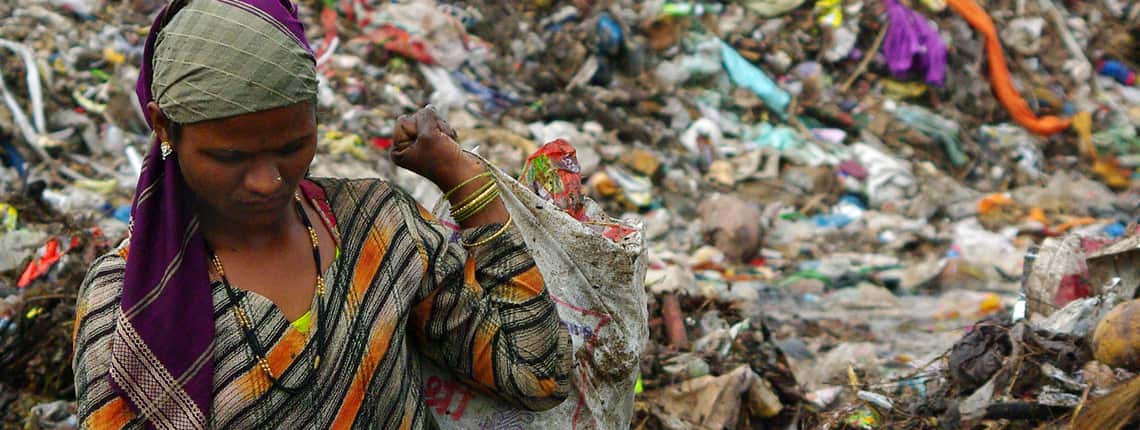
WIEGO’s Exposure Dialogue Programme (EDP) on Law and Informality brought global experts to Ahmedabad, India, to stay two nights in the homes of Self-Employed Women´s Association (SEWA) members. Experts followed workers in their daily schedules — from morning religious rituals to long days on dump sites. Sonia Dias, WIEGO’s Waste Picker expert based in Belo Horizonte, Brazil, was one of the participants, and the experience provided powerful insights into ways workers’ lives can be bettered — and, as importantly, how exchange breaks down barriers toward better policymaking. She shares her on-the-ground experience with us here.
I arrived in Ahmedabad in the wee hours after a long flight from Brazil to India. It was chilly but pleasant, and I was ready for anything this time. My last visit did not end very well, but I was hopeful that this time I would reconnect with a country I love dearly.
Coming here for an Exposure Dialogue Programme would give me the chance of a lifetime to live and work with a waste picker family. After two days in their home, I would join other participants — lawyers, researchers and judges from five countries, alongside my WIEGO colleagues, the Self-Employed Women´s Association (SEWA) members, and professors from Harvard´s Law School — for a three-day reflection. I was excitedly anticipating the days to come.
“Recall the face of the poorest…”
We began the day with a visit to Gandhi’s Ashram, which set us in the right mood for the experience ahead. Gandhi gave us a “talisman” to help us test ourselves in times of doubt: “…recall the face of the poorest and the weakest man whom you may have seen, and ask yourself, if the step you contemplate is going to be of any use to him. ... Will it restore him to a control over his own life and destiny?”
I come from a city, Belo Horizonte, in Brazil, where improvements to infrastructure and basic services for informal settlements began in the mid-1980´s, so I cannot help but notice how absent the State is in India when providing citizens with basic services.
In the moment, as I embark on this new journey, I feel he is asking us to think of poverty beyond an abstract concept. We need faces and names to understand the role we can all play in social change. And this is what we are about to do at the EDP: understand the lives, strengths and hardships of informal workers — waste pickers, home-based workers and street vendors — in the slums of Ahmedabad and gain a firsthand understanding of what can we do in our fields of expertise to advance change.
Meeting our host
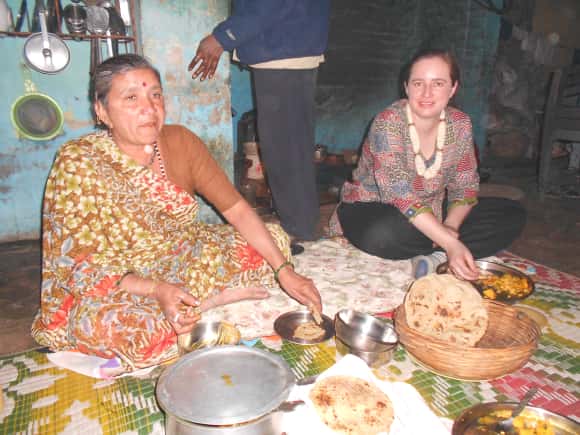
Before I set off to for my host family, I am introduced to my companion during my time, Juliana Gomez, a young and committed lawyer who works as a researcher at the Center of Socio-legal Studies (CIJUS) at the Universidad de los Andes in Bogotá, Colombia.
Juliana and I are ready to immerse ourselves and head to meet our host, Kantaben, a 51-year-old waste picker, who has been in the trade since she was 18. Kantaben was following in the footsteps of her mother-in-law, who introduced her to the trade after she married.
Kantaben lives with her husband, two sons, a daughter-in-law and grandchildren. Her eldest daughter is living with them temporarily, as well, making for a total of 12 people in this small household.
Inside Kantaben’s home
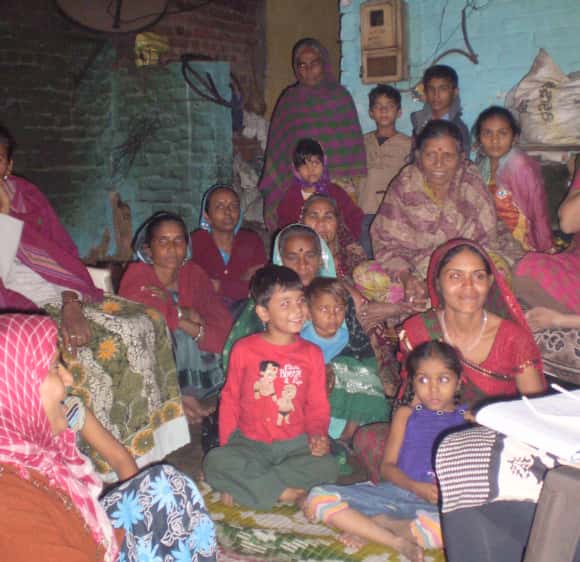
As we make our way to Kantaben’s home, we become the sensation of the slum, especially with the kids. Being white, Juliana is immediately identified as a foreigner, but because of my resemblance to Indian women, they are not quite certain what to make of me. Some kids and women cautiously approach me in Gujarati, the local language. I start playing and smiling at the kids to make up for my language handicap.
At Kantaben’s, I can see straight away that her house is different from the others. I learned later that she had it built after getting a loan from SEWA. She also has electricity and pumped water supply that she received through a programme SEWA developed with the municipality. The programme provided SEWA members with loans, enabling them to access these fundamental services.
My experience with Kantaben’s daily life has further convinced me that building synergies between governments, non-governmental organizations (NGOs), membership-based organizations (MBOs), and other sectors are fundamental in shaping inclusive public policies that address the basic needs of the working poor.
Discussing upgrading in the neighbourhood prompted me to reflect on the reality I had seen at home. I come from a city, Belo Horizonte, in Brazil, where improvements to infrastructure and basic services for informal settlements began in the mid-1980´s, so I cannot help but notice how absent the State is in India when providing citizens with basic services.
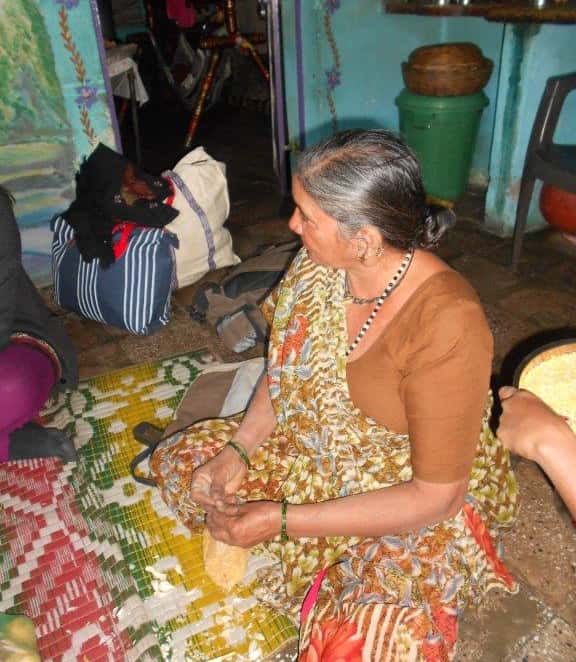
Kantaben’s sorting skills
After following Kantaben for a day, we quickly come to learn that her life is one of routine. She works seven days a week in an open dump, waking up at 4:00 a.m. and heading off to work by 6:00 a.m. She doesn’t return home until after 5:00 p.m. She tells us with pride that her grandchildren go to school and are not involved in waste picking.
On the first day, after spending a lot of time with us, Kantaben is behind in her sorting. She brought home some of the materials from the dump site and starts, with the help of her husband, skillfully sorting through paper, metals and other throwaways. Juliana and I join in the work, only to quickly realize that this is far too skilled a job for us.
After they finish sorting, we follow Kantaben and her husband to the small junk shop next door, where they sell all the recyclables. Kantaben makes around 100 to 150 rupees a day from her work.
Read about dump upgrading in Senegal and the risk to waste pickers' livelihoods.
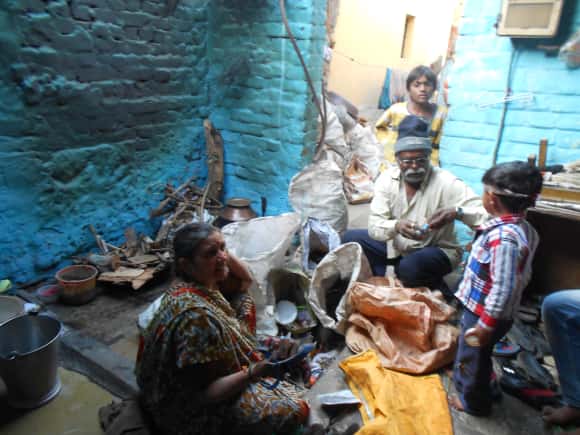
She uses this money to buy dinner for the family. Many informal workers live off their daily earnings with little leftover.
We set off to the next street, where we buy split lentils, rice, potatoes, ginger, lemongrass, garlic, carrots and other necessities. In all, she spends around 90 rupees for the day´s dinner.
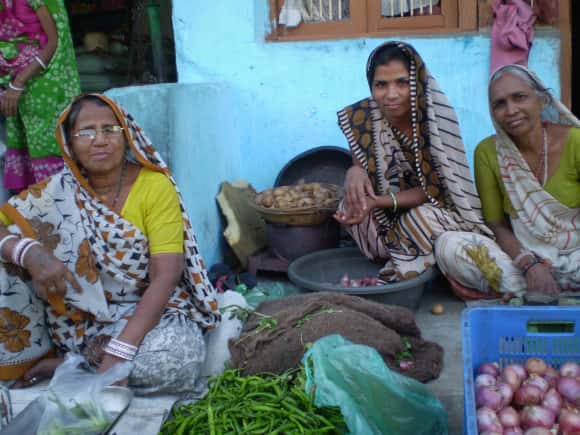
Early morning on the dump site
The next day, we are at it early. By 4:00 a.m., Kantaben, Juliana and I are already up. We drink tea and eat yesterday´s rotis. The temples across the neighbourhood begin their morning calls. We have to use our lantern to guide us as we hurry through the dark streets to get a rickshaw to the dump. We pay 5 rupees each for the ride.
As we arrive at the dump, it is still dark. The moon lights our way, and we are surrounded by ferocious dogs (30 per cent of the work injuries in this dump are from dog bites). The site is already crowded with pickers. Kantaben puts on her work gear and starts rummaging through the waste.
Read about open dump closures and their impact on waste pickers' livelihoods.
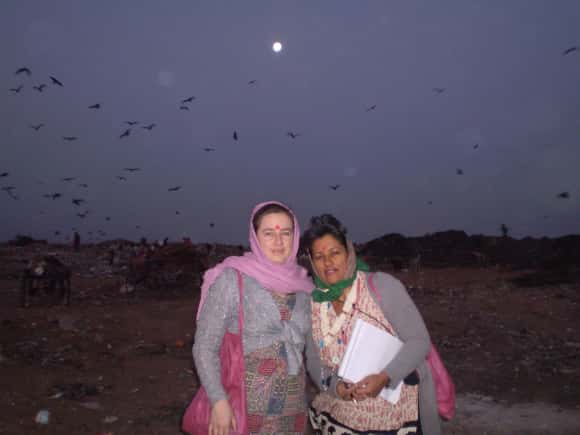
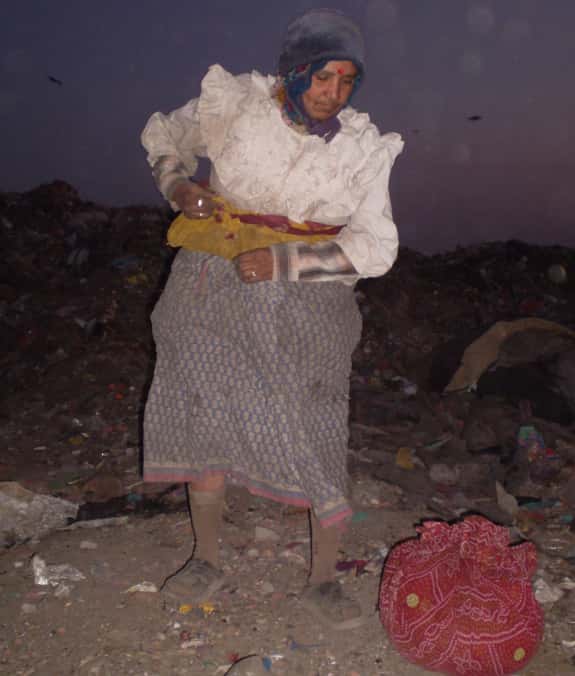
Kantaben works steadily, and at 9:00 a.m., the first trucks from the city arrive with waste from the day´s collection. The earth trembles each time a truck passes by. Landslides are a constant threat in open dumps everywhere.
I spot a small child playing near her parents as they work. I can’t help but think about the difference between this young girl and Kantaben´s grandchildren, who have not been involved in waste picking and all go to school. Kantaben´s engagement with and support from SEWA seems to have played a role here, as she has been able, in spite of all the hardships of her life, to give other opportunities to her family.
At the end of her working day, Kantaben sells what she managed to collect at one of the many junkshops surrounding the dump and sets off back home.
Reflections from ground-level to policy
My experience with Kantaben was powerful on many levels. On the professional side, many thoughts came to my mind during this exposure, but there is one in particular: the impacts of public policies on securing the livelihoods of millions of people in the world.
The daunting challenge is to move up from dumps to proper sanitary landfills while securing alternatives for waste pickers.
My experience with Kantaben’s daily life has further convinced me that building synergies between governments, non-governmental organizations (NGOs), membership-based organizations (MBOs), and other sectors are fundamental in shaping inclusive public policies that address the basic needs of the working poor. Anytime I go to a dump, I am aware both of the inhumane work environment that these places are and how they are still the only source of livelihood for millions of people across the world.
The daunting challenge is to move up from dumps to proper sanitary landfills while securing alternatives for waste pickers elsewhere in the recycling industry. This requires a vision and a work plan so that the needs for protected environment and protected work (following on the vision of decent work) is coupled with secured livelihoods.
The existence of brave people like Kantaben, who face the risks of this work environment every day, brings us an ethical constraint. It is everyone´s responsibility to struggle for concrete changes for all.
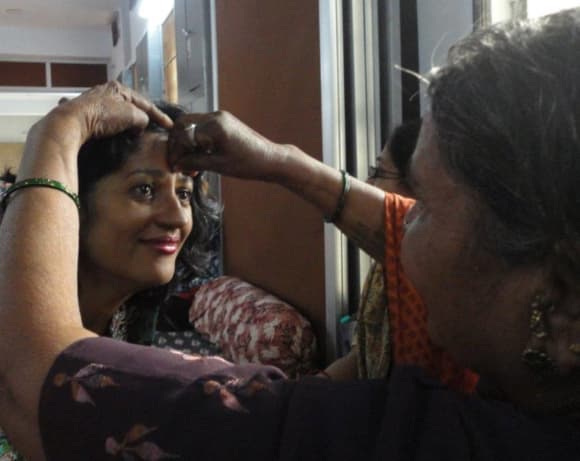
Sonia Dias' trip to India to visit Kantaben and the dump site happened in 2013, but the issues of open dumps persist today. Read WIEGO's position on open dumps.
Feature photo: Julian Luckham
Related Posts
-
Informal Economy Theme
-
Informal Economy Topic
-
Occupational group
-
Region
-
Language
